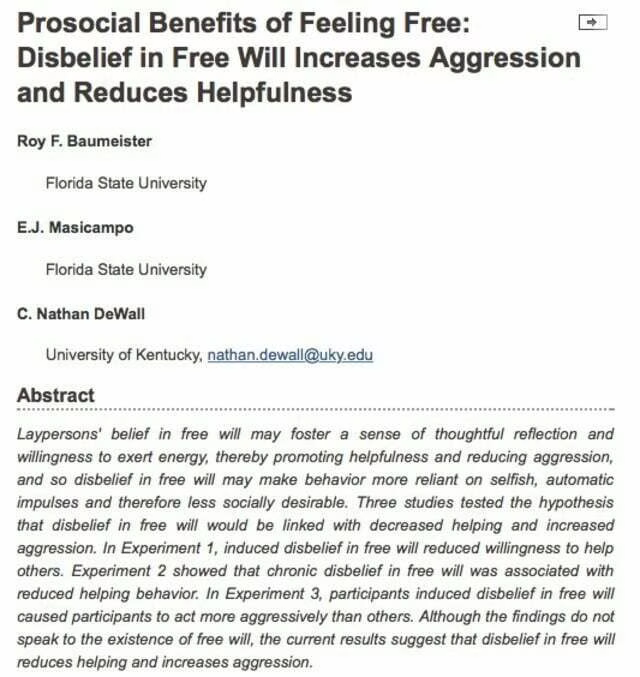Why Studies Show That Attacking Free Will Makes People Less Moral

If you’ve been monitoring the free will debate at all you might recall that some studies were done recently that show the removal of the belief in free will makes people act more selfishly.
I’ve been arguing for some time that humans believing that free will is an illusion can, and ultimately will, lead to us being more compassionate to each other, and—as my opponents in this discussion are right to point out—this seems to directly refute that position.
Fair enough. And I while I’m no expert on doing scientific research, I don’t see any issue with the findings whatsoever. But I have a theory for why they got the results they did.
I think this is easily explained by the notion that imposition of false morality on people, only to have it removed at a later date, often produces many negative kinds of behavior.
One example that may be familiar is the kid who spends his entire childhood and teenage years in a strict Catholic school, where he learns to fear things. He fears the wrath of God. He’s afraid to swear. To steal. To be mean to people. To drink alcohol. To have sex.
Then he enters college and realizes the teachings were false/and or evil, and proceeds to smoke, steal, have sex, drink, and basically do the opposite of every single teaching he learned from the priests.
His roommate, meanwhile, is telling him to stop doing this things for various reasons—some for moral reasons, others for health reasons.
But to the Catholic kid it’s all the same: the primary reason he was taught not to behave immorally was because God didn’t want him to and would punish him if he did, and now that he doesn’t care what God thinks (or even believe he exists) he is free to do whatever.
His roommate is now having to introduce a strange idea to him:
Morality isn’t based on being afraid of God punishing you. You should be nice just because it’s the right thing to do.
I am arguing that the situation with free will and the subjects in this study is identical.
People are taught from an early age that there’s an afterlife, or a universal spirit, or a higher power. The vast majority of us feel—even if it’s subconscious—that if we behave immorally it will come back to us somehow, because someone is keeping score.
This study temporarily removed that belief by convincing people that—no—there isn’t some cosmic balance to it all. We can actually just cheat and steal and nobody is watching.
So, just as with the Catholic kid, they behaved badly.
This should fail to surprise, and it actually supports my contention that belief in free will is poisonous. That link may seem tenuous, but it is not when you consider what normally ships with the free will package.
Free will is often inexorably bound to the notions of being universally connected and intertwined with either God, a universal spirit, or a higher power. People link these two things.
This is why I recommend teaching the true, reductionist perspective of the world early on. We should not give people the false moral scaffolding of universal watching spirits, or protectors in the sky who know what you’re doing and may judge you in the future.
These frameworks are too easily ignored or discarded, and at any rate seem at times to be too abstract to change behavior. It’s as if you’re getting the worst of both options: it’s too abstract to help in most cases, and produces negative effects when discarded.
I could be wrong about this, but I see this common scaffolding as plainly inferior to teaching an empathy and compassion-based morality that centers around true human experiences.
This is an empirical question, though, to be sure. So I could simply be wrong. It could be that removing this fear would cause all sorts of evil in most people, while improving the behavior of some.
But I have a way to test the theory as it applies to the study that was done: simply try the study with materialists who are free will skeptics. Try it with people who don’t believe in a God, a universal spirit, or a higher power.
I am willing to bet that it does not change their moral behavior.
It’d be the same as telling an atheist that God won’t smite you if you curse, and measuring whether they start cursing more. They wouldn’t, because the reason they don’t curse isn’t based on a belief in God.
And that’s how morality should be. We should be nice to people for a reason other than thinking a vengeful God, or a higher power, or a universal spirit is ultimately keeping track of our infractions with the intent to punish.
We should be moral because it’s the right thing to do.
My prediction is that when a modified version of this study is done in the way I described, we will see the belief in free will behave much like Catholicism in this model, and that those without the indoctrination will not be affected by its removal.
The more interesting point then will be empirically measuring the morality of those who are materialist, free-will skeptics vs. those who believe in free will. But we can start with making the simple adjustment to the studies already done.
Notes
Academic research being behind a paywall is an abomination and an indictment against the state of our civilization. Make your fucking research transparent. Universities, like police and fire services, belong to the people, and so should the knowledge that comes from them.
Here’s a link to the study >.